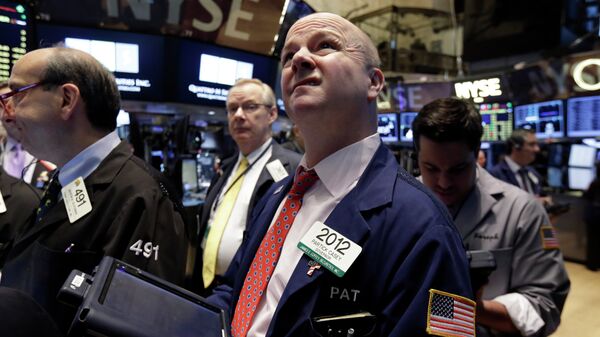Kristian Rouz — US markets posted gains Friday, ending their week of losses, after Fed chair Janet Yellen confirmed the regulator's commitment to further tighten its monetary policy, though on a cautiously gradual basis. Softer real economy data weighed on the performance of stocks, however, as Q4 growth decelerated slightly, and corporate profits fell, as expected, due to the dollar's strength. Meanwhile, crude oil continued to depreciate, falling over 6% this past day only, as less drilling rigs put out of commission in North America this past week, while the oversupply of oil is still there, and the newly emerged Yemeni risks have turned out to be negligible on a global scale.
"The actual path of policy will evolve as economic conditions evolve, and policy tightening could speed up, slow down, pause, or even reverse course depending on actual and expected developments in real activity and inflation," Ms. Yellen said Friday during her speech in San Francisco.
Markets cheered, with the S&P 500 Index edging close towards its ninth consecutive quarterly rise, only 0.5% below its all-time highest. The Index added only 0.2% Friday, having shed 2.2% during this past week. The advance could have been more solid if not for the weak US macroeconomic data. America's economy expanded 2.2% in Q4 year-on-year, according to a report by the Department of Commerce compared to the annualized growth of 5% in Q3.
Corporate profits fell 1.6% last quarter, dragged down by a stronger dollar, while in Q3 the figure was a positive 4.7%. Big businesses' overseas earnings took the biggest hit, as anticipated, having fallen 8.8%, their greatest decline since the 2007-2009 recession. Compared to the over 20% appreciation of the dollar, the fall in overseas profits does not look very dramatic though.
The Nasdaq Index advanced at a more buoyant pace Friday, rising 0.6% after Inter Corp. reported they are in talks buying Altera, the latter skyrocketing 28% on the news.
There was a lot of selling bets in the tech sector, however, with several major enterprises posting weaker-than-expected earnings reports. SanDisk Corp. crashed 26% after having cut sales outlook, while Nvidia and Micron Tech both retreated over 7%.
The Federal Reserve clearly indicated their policy moves will be full, predictable and transparent, with US credit costs increasing at a gradual pace in conjunction with the data coming from the real economy, as inferred in Ms. Yellen's speech. That said, there is more confidence in the markets, and the decreased uncertainty has prompted many investors to make more buying bets.
US consumer spending has given the markets a very positive signal, advancing an annualized 4.4% in Q4, above the anticipated increase of 4.2% and the fastest since Q1 2006. US Commerce Department also reported more exports, also revising exports outlook up, while the volume of imports also increased.
However, oil prices have still posted their second consecutive week of gains. In America, WTI crude is at $48.87/bbl, while Brent oil sells at $56.41/bbl. Iran is now providing only 1 mln bpd of oil to the global market as compared to 2.5 mln bpd in 2012, before the US-imposed sanctions were intact. If the nuclear deal is struck, Iran may quickly return to its normal capacity of oil output, and the whole supply side of the market will take a huge blow.
However, the ongoing talks might as well be postponed for an indefinite amount of time due to the military and political concerns of Israel and Saudi Arabia.



